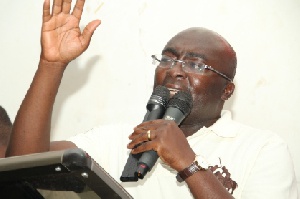Running mate to the 2106 flagbearer of the New Patriotic Party (NPP), Dr. Mahamudu Bawumia, has disclosed that the interests on some loans in 2014 alone were four times Ghana’s oil revenue.
According to him, the National Democratic Congress (NDC) government’s excessive borrowing had increased the country’s debt stock to GH¢69.7 billion as at the end of September, 2014.
This increase in the debt stock, according to the economic expert, had left government with little resources to spend on critical areas of the economy and cited the 2014 budget - which allocated a total of GH¢2.6 billion to the Ministries of Roads and Highways, Trade and Industry, Food and Agriculture, Transport and Water Resources and Housing - was far less than what was allocated to interest payments in 2014.
He therefore wondered what would have happened if these payments were invested in the educational sector in the country, warning that the country risked going back to the status of a highly indebted poor country (HIPC), which was addressed by the NPP, if nothing was done about the situation after a similar borrowing trend by the previous NDC government 10 years ago.
Speaking to members of the Bimoba Students Union (BISU), Dr. Bawumia challenged the government to point out any development project that oil revenue and an estimated amount of GH¢27 billion borrowed had been used for.
He observed that government’s expenditure on infrastructure was declining, with 94 percent on recurrent expenditure, an amount enough to construct the country’s roads and pay for completely free senior high school (SHS) for 25 years.
Recent developments, in his view, indicate a deterioration of Ghana’s public financing culminating in government’s inability to honour statutory payments such as the GETFund, National Health Insurance Scheme (NHIS), District Assembly Common Fund (DACF), salaries and payments to contractors due to government’s overspending in 2012/2013.
Government’s tax revenue in the wake of these, he added, stayed constant at 17.7 percent of Gross Domestic Product (GDP) with expenditure going up by 6.6 percent of total income by the end of 2013.
The NPP vice presidential candidate said cost of living witnessed a sharp increase which had a direct impact on the equality of education through the reduction of disposable income and lamented increases in the prices of fertilizers, petroleum products, food, housing, utilities and high cost of healthcare delivery.
He slammed government and the National Petroleum Authority (NPA) for failing to reduce the prices of petroleum products, despite a significant drop in the prices of crude oil on the world market. He described the automatic price adjustment formula as ‘automatic upward price adjustment formula.’
Government’s indebtedness to the Bulk Distribution Companies (BDCs) to the tune of GH¢400 billion according to Dr. Bawumia, is a mystery, taking into account the withdrawal of subsidy on petroleum products, and demanded that government provide more credible explanation for its position.
He observed that youth unemployment is on the rise and said that that discourages efforts of students and parents in the wake of the inability of the 2015 budget to provide hope in this direction with real GDP growth declining in 2011 from 15 percent to a possible 3.9 percent in 2015.
Dr. Bawumia tasked government to redeem its campaign pledge of resourcing the Savanna Accelerated Development Authority (SADA) with an amount of GH¢100 million annually and not the meager $25,000 in the budget after several protests.
General News of Tuesday, 6 January 2015
Source: Daily Guide

















